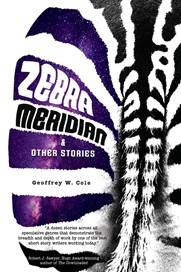 Zebra Meridian and Other Stories
Zebra Meridian and Other Stories
by
Geoffrey W. Cole
(Stelliform Press, September 2024, pb, 306 pp.)
“Billy Ray’s Small Appliance Rehabilitation”
“The Five Rules of Supernova Surfing, or, A For Real Solution to the Fermi Paradox, Bro”
“Song of Mary”
“Two from the Field, Two from the Mill”
“Captured Carbon”
“The Way of the Shrike”
“River of Sons”
“‘Ti Pouce in Fergetitland”
“Desolation Sounds”
“On the Many Uses of Cedar”
“Zebra Meridian”
“Cradle and Ume”
Reviewed by Victoria Silverwolf
This collection contains ten stories that previously appeared in magazines or anthologies, as well as two newly published works of fiction. In addition to the tales listed above, the book also offers three poems.
A few of the reprinted stories have already been reviewed by the staff of Tangent Online. I will offer links to these reviews, as well as short quotes.
“Two from the Field, Two from the Mill” (On Spec #109, December 2018) won praise from reviewer Kevin P Hallett, who added it to that year’s Recommended Reading list.
https://tangentonline.com/print-quarterly/on-spec/on-spec-109-december-2018/
“This is a short fantasy that considers a world after all the species of canine have floated away into the sky. . . .This was a strange and intriguing story that was hard to put down. The prose was nicely crafted and the ending unexpected.”
The same reviewer discussed “The Five Rules of Supernova Surfing, or, A For Real Solution to the Fermi Paradox, Bro” (Clarkesworld #184, January 2022), offering a positive opinion. (It should be noted that this whimsical science fiction romp was nominated for an Aurora Award as Best Short Story.)
https://tangentonline.com/e-market-monthly/clarkesworld-184-january-2022/
“Two surfer dudes leave Earth to ride the shock waves of supernovas . . . . It was an entertaining read despite the rad language.”
I reviewed “River of Sons” (Beneath Ceaseless Skies #360, July 14, 2022) and offered a mostly positive opinion, with some reservations.
https://tangentonline.com/e-marketbi-weekly/beneath-ceaseless-skies-360-july-14-2022/
“. . . a magical version of the First World War . . . full of fantastic elements . . . Not all of these prove to be relevant. . . . shift in tone may put off some readers. . . . a welcome touch of moral ambiguity.”
These three tales, as well as the other previously published stories, provide evidence that the author has a vivid imagination and is capable of creating a wide variety of speculative fiction, with moods ranging from humorous to horrific. The two works original to the book warrant more detailed discussions.
In “Desolation Sounds,” a woman recovering from a traumatic incident accompanies her fiancé and his teenage son on a sailboat to an isolated bay. They discover an abandoned boat and encounter a supernatural menace.
The emphasis is on characterization, particularly in the way the woman changes her personality in an attempt to deal with a terrible loss. A flashback to this tragic happening is the most powerful part of the story. The main plot, which will be familiar to readers of Lovecraftian cosmic horror, is not quite as effective.
“Zebra Meridian” takes place at a time in the future when machines, controlled by what are essentially aristocrats, remove excess carbon dioxide from the atmosphere. A member of the elite extended family that profits from these devices falls in love with and marries a woman who grew up in a refugee camp.
The ruler of the family desires her for himself. He forces her to divorce the man she loves and marry him instead, in order to rescue her family from poverty and her sister from kidnappers. The plot deals with the woman’s attempt to rejoin her beloved while protecting her family.
The author offers a detailed portrait of this imagined future. The plot depends on the ruler being subject to very strict rules, some of which seem unlikely and contrived.
One curious aspect of the story is that the woman is a fervent fan of twentieth century Italian movies. (Frequent analogies are made between these films and her life.) She lives in the middle of the twenty-third century, so this seems a little unlikely, like a modern woman being obsessed by eighteenth century literature. This is a very minor quibble, but may put off some readers.
Overall, the collection offers sufficient variety for almost any fan of imaginative fiction to find something of interest.
Victoria Silverwolf is not obsessed by eighteenth century literature.